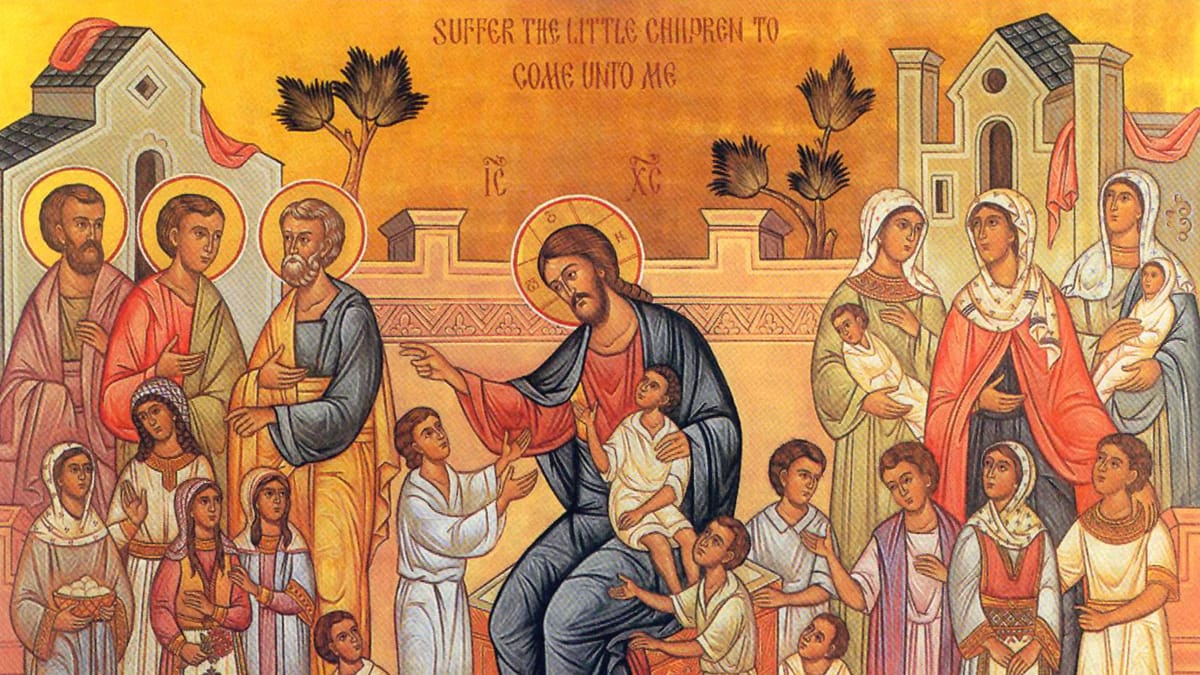Children of the Eschaton
If the disciples are to expect some kind of biological or spiritual progeny, then whence apocalypse?

Near the end of The Secret Book of James, Jesus' disciples James and Peter are asked by the other disciples about a secret message allegedly given to the pair by the resurrected Jesus.
"What did you hear from the teacher? What did he tell you? Where did he go?"
We answered them, "He ascended: he gave us his right hand and promised all of us life; he showed us children coming after us, and commanded us to love them, since we are to be saved for their sakes."
When the disciples heard this, they believed the revelation, but they were angry about those who would be born. I did not want to offend them, so I sent each one of them to a different location.
Of course, major Christian traditions consider this account's historicity dubious. The book was discovered only in 1945, and its themes (like other books in the Nag Hammadi) are textbook-gnostic and have found no place in any New Testament canon.
But what can we learn about this gnostic community from this curious exchange? Who are these "children," and why did the idea of them make the disciples so upset, and with no further explanation from the narrator? Was there some meaning latent in this narration that was supposed to go without saying?
We can only guess. But in light of the apocalyptic fervor that gripped the Jewish community and, perhaps to a greater degree, the fledgling Christian church at the time, frustrated eschatological expectations are, I think, a likely explanation.
I've written before about the role of an eschatological horizon in shaping the spiritual consciousness of early Christians. As David Bentley Hart writes in Tradition and Apocalypse, "It should never be forgotten that Christianity entered human history not as a new creed or sapiential path or system of religious observances, but as apocalypse." Jesus himself, of course, speaks in eschatological extremes, inflaming the apocalyptic fevers that most historians agree already ran hot in first-century Palestine. Here's Jesus speaking in Mark 13:
And then they will see the Son of man coming in clouds with great power and glory. And then he will send out the angels, and gather his elect from the four winds, from the ends of the earth to the ends of heaven. "From the fig tree learn its lesson: as soon as its branch becomes tender and puts forth its leaves, you know that summer is near. So also, when you see these things taking place, you know that he is near, at the very gates. Truly, I say to you, this generation will not pass away before all these things take place.
Uncovering the myriad ways this vision of apocalypse colored the early Christians' experience and shaped their milieu would require a textbook – more than I'm able to do here. But we can find what are likely among the earliest rumblings of an extreme apocalyptic social paradigm leveled in I Corinthians by St. Paul himself in anticipation of what he calls "impending distress."
Now concerning the unmarried, I have no command of the Lord, but I give my opinion as one who by the Lord’s mercy is trustworthy. I think that in view of the impending distress it is well for a person to remain as he is. Are you bound to a wife? Do not seek to be free. Are you free from a wife? Do not seek marriage. But if you marry, you do not sin, and if a girl marries she does not sin. Yet those who marry will have worldly troubles, and I would spare you that. I mean, brethren, the appointed time has grown very short; from now on, let those who have wives live as though they had none, and those who mourn as though they were not mourning, and those who rejoice as though they were not rejoicing, and those who buy as though they had no goods, and those who deal with the world as though they had no dealings with it. For the form of this world is passing away.
While there is not here any express prohibition against having children, taking the author seriously entails a hesitancy to engage in something so forward-looking, certainly, as one's biological legacy. Not only should the married live as if unmarried, but all should strive to be emotionally unmoved by the normal course of life's joys and sorrows – from the ebbs and flows of what most, I think, might consider to be the fullest experience of living, itself, and thereby a far fetch from the motivations that typically lie behind a couple's decision to have a baby.
Indeed, these are serious eschatological reckonings, and they beckon the most drastic of responses. Absolutely nothing, in this or any other Pauline passage, proposes procreation and child-rearing as some kind of spiritual offering or exercise, and Paul's apocalyptic vision – characterized here by impending distress – should leave us entirely unsurprised about this.
That said, the "decision to have children" was understood quite differently by ancient Mediterraneans than it is by most couples today. In a way, there was hardly a "decision" to be made. Bearing children was a fact of life. Many historians estimate the average Mediterranean woman living around the time of Christ gave birth five to six times.
Indeed, the subject of children and how to think about procreation seems to be of almost no interest to the Paul that we know.
Of course, this is only relevant to the cited passage from The Secret Book of James insofar as the disciples' anger about the "children to be born" is, in fact, rooted in frustrated eschatological hopes. If the disciples are to expect children (even if only figurative, in some way, and not necessarily biological), then whence apocalypse? Jesus spoke always in eschatological extremes, and in the context of a nation that was, at the time, charged with apocalyptic anxieties. A few decades later, Paul downplays progeny and marriage itself, choosing instead to focus on the apocalypse that is coming "soon."
Children, at this hour? Is this not some kind of about-face? And given the sacrifice the disciples made, is it even, perhaps, insulting?
Whether or not some dissonance between Jesus' prophetic revelation to the disciples (about "children coming after") and the disciples' prevailing eschatological purview is the reason for the disciples' anger, it's hard to believe these questions about progeny, and the future itself, didn't pepper the early Christian conscience with confusion and doubt.
The theophany inherent in the Christ undoubtedly entails imminent apocalypse. But "children coming after" seemingly does not.





